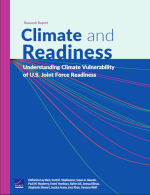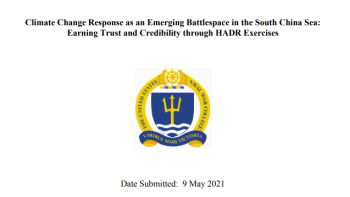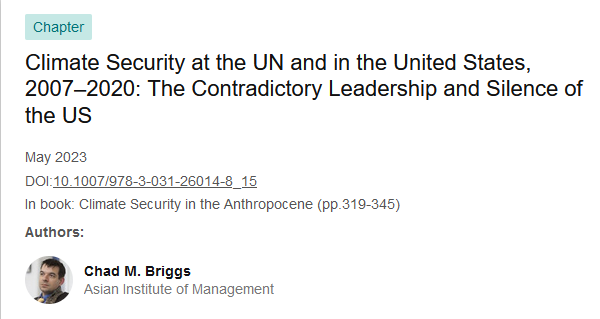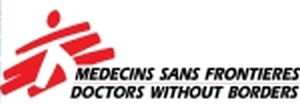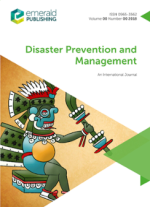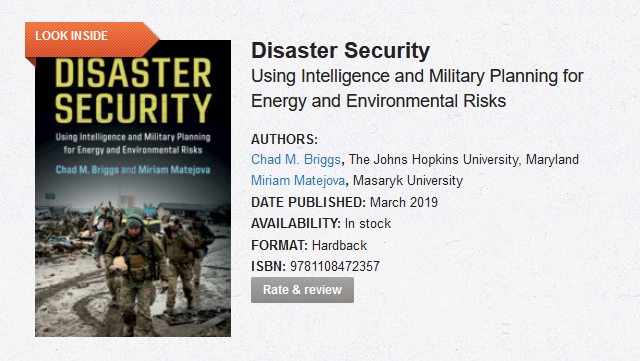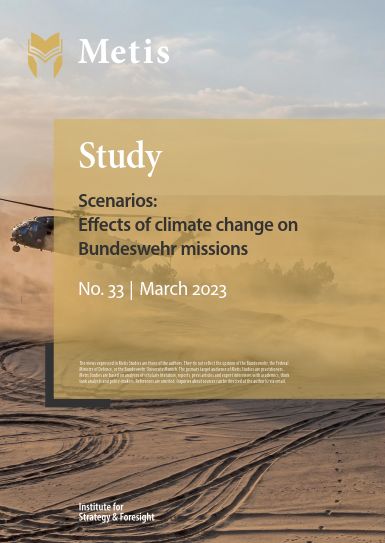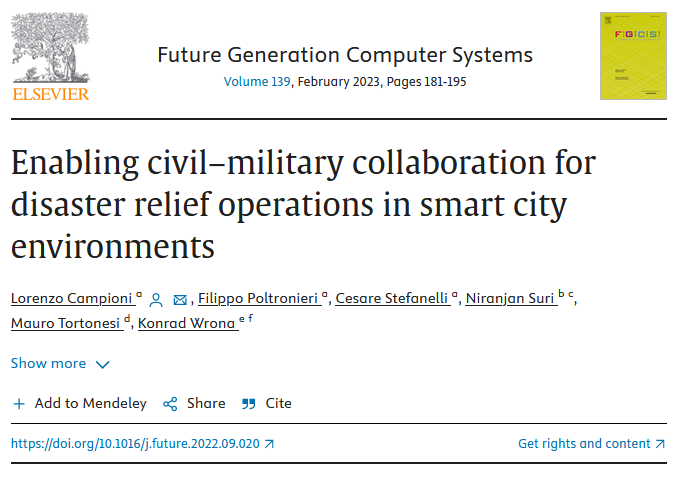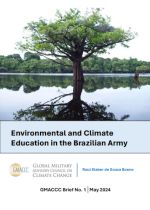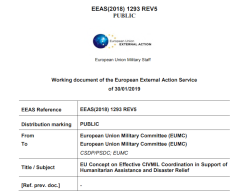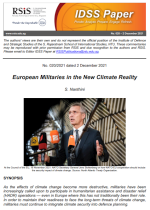PUBLICATIONS
Climate and Readiness: Understanding Climate Vulnerability of U.S. Joint Force Readiness
2023 - Acknowledging that climate effects are likely to become more severe as global temperatures rise, the authors of this report discuss the results of an initial study they conducted to develop links between climate and readiness, laying the groundwork for the eventual integration of climate risk with quantitative readiness assessment and decision making to help ensure that military forces can reliably and affordably sustain needed readiness in a changing climate.
Climate Change Response as an Emerging Battlespace in the South China Sea: Earning Trust and Credibility through HADR Exercises
May 2021 - Climate change offers a unique opportunity for the United States to flex soft power in the South China Sea (SCS). Incorporating climate change resilience and response into its operations with partner nations is an important method for the U.S. to counter China’s grip, increase U.S. validity in the region, and strengthen regional organizations.
Climate Security at the UN and in the United States, 2007-2020: The Contradictory Leadership and Silence of the US
May 2023 - The chapter outlines how differing concepts of national, ecological, and human security influenced US policy toward the United Nations – especially in the context of the United Nations Security Council – and other international relations, and how by 2020 they intersected with disinformation, the Covid-19 pandemic, and overwhelming climate-related events. The analysis is based on primary climate strategy documents from the US government and different institutions, as well as secondary sources and analysis on topics of climate security.
Cyclone Mocha: Aid efforts severely hampered by new restrictions
27 July 2023 - "Initial response efforts were positive. The military authorities and armed groups such as the Arakan Army led efforts to clean debris from roads, and telecommunications and electricity were restored. ... However, the current response is far from what is required."
Defining limits: Ecological overshoot as a driver of conflict
2022 - This article describes the overuse of biological resources as a national security issue, with trends of deepening ecological debt (at the country level and globally) likely to become an increasing source of economic and political instability. It argues for radically reducing resource dependence as part of future national security strategies.
Determinants of HADR mission success: exploring the experience of the Malaysian army
July 2014 - The purpose of this paper is to empirically explore issues in humanitarian aid and disaster relief (HADR) missions and examine the effects of selected factors on mission success. The paper focusses on organisational perspectives of the Malaysian army due to their extensive experience in HADR operations.
Disaster Security: Using Intelligence and Military Planning for Energy and Environmental Risks
March 2019 - This book is for a broad audience of practitioners, policymakers, scholars, and anyone interested in scenarios, simulations, and disaster planning. Readers are led through several different planning scenarios that have been developed over several years under the auspices of the US Department of Energy, the US Air Force, and continued work at GlobalInt LLC.
Effects of climate change on Bundeswehr missions
This study discusses the security implications and effects of climate change on future Bundeswehr operations. To this end, the study draws on and combines scenarios published by the Intergovernmental March 2023 - Panel on Climate Change (IPCC) on emission-induced climate change as well as the associated processes of socio-economic transformation to create three reference scenarios that describe different climate-related operational scenarios. On the basis of the different development pathways of these scenarios, future challenges resulting from climate-induced operations are outlined and recommendations for action for the Bundeswehr are derived.
Enabling civil–military collaboration for disaster relief operations in smart city environments
February 2023 - To address the aftermath of ever more frequent natural disasters striking highly-populated urban areas, Humanitarian Assistance and Disaster Relief (HADR) operations increasingly involve the coordinated efforts of multiple agencies and in particular Civil–Military Cooperation (CIMIC). In such scenarios, rescuers operate in a disrupted environment, must maintain a high operational tempo, and need to quickly make high-impact decisions.
Environmental and Climate Education in the Brazilian Army
25 May 2024 - Public and private figures have debated the creation and inclusion of Climate Education in school curriculum. Experts from different areas have contributed to intensifying the debate on the topic, pointing out possible directions for the country's strategic decision-makers. In a simplistic way, one of the main points of polarization in the discussions is that some of the debaters support Climate Education in a “pure and emergency” way and the other part advocates that the topic be addressed in an interdisciplinary and ransdisciplinary manner by the already established Environmental Education. The objective of this brief contribution is to bring some reflections on this debate, showing the option adopted by the Brazilian Army, in the face of the climate issue in the educational area.
EU Concept on Effective CIVMIL Coordination in Support of Humanitarian Assistance and Disaster Relief
30 January 2019 - This report was approved by the EU Military Committee in 2019 and collects lessons learnt and best practices from years of mutually beneficial engagement between the EU Military Staff and the European Commission, and provides direct operational guidance to EU Mission and Operation Commanders.
European Militaries in the New Climate Reality
2 December 2021 - As the effects of climate change become more destructive, militaries have been increasingly called upon to participate in humanitarian assistance and disaster relief (HADR) operations — even in Europe where this has not traditionally been their role. In order to maintain their readiness to face the long-term threats of climate change, militaries must continue to integrate climate security into defence planning.
